Every so often, I get into the personal advice game. Perhaps it’s a side effect of being a father, as well as hitting a point in life where you’ve seen and done a lot. I like to share whatever wisdom I’ve learned, in the vain hopes that someone else can benefit from my experience. That’s especially true for younger people who have a passion for cities, for development, and for making beautiful places.
Along those lines, in this episode, I discuss my pet peeve with the word “they,” how to think about issues in your community, and what I’ve learned about external locus of control vs internal locus of control.
Get building, get positive and work towards a better future.
Find more content on The Messy City on Kevin’s Substack page.
Music notes: all songs by low standards, ca. 2010. Videos here. If you’d like a CD for low standards, message me and you can have one for only $5.
Intro: “Why Be Friends”
Outro: “Fairweather Friend”
Transcript:
Kevin K (00:01.26)
Welcome back to the Messy City podcast. This is Kevin Klinkenberg. Thanks for joining me. It's been a while since I've had the opportunity to do a solo podcast and just talk about a few things that are going on and some thoughts in my mind. And today seemed to work out really well for that in this week. So I'm going to share a few things that are going on and hopefully give you a little bit of inspiration in your day.
If it doesn't inspire you, you can send me a note as well and say, hey, you were completely off base there or lost and that's fine too. Of course, I can't help but record these now and think about my friend Chuck Morrone's comments about my own voice and how things sound. I think if you do anything like this, you're the kind of person you probably never liked the sound of your own voice, but it's good to know that others respond to it and like it.
And I'm happy to keep doing these. There's a lot going on right now. There is coming up here in May is the Strong Towns National Gathering followed by the Congress for the New Urbanism. It's a big deal in the urbanism world. Those annual confabs, which I have gone to for a number of years. Don't know that I'll keep going to those indefinitely, but I still think there's value in that or similar groups like them.
depending on what your own interest is. I'm also keenly aware that the National Town Builders Association does a couple great get togethers every year. Those are, that tend to be people more on the development side, as well as the Urban Guild, which is a group that I'm a little bit affiliated with as well, which is mostly designers and architects, but it's a lot of people doing really, really cool stuff to try to make the world a more beautiful and better place.
They have a get -together coming up this later later this year in November, which will be in Huntsville, Alabama And I'm gonna try to make it to that as well. Don't know if I can do all these things. It's a challenge when you've got a family and work and everything else, but I do always enjoy getting together with colleagues and learning about what other people are doing Figuring out what I can take back to my own community and just getting inspired from other people. So
Kevin K (02:28.844)
I have always enjoyed that. I suppose it appeals to the extroverted nature that I have. But I certainly enjoy getting that inspiration from others. So I want to talk a little bit today on a different tack. This is not necessarily a new subject locally, but it's something that's been on my mind. And bear with me as I go through this, but there's a new...
There's a new attraction in Kansas City that opened late last year. We are among many cities now in that we have a Ferris wheel near the downtown area because you know how these things are, all the trends come and go and activities come and go. And right now it seems like every city has to have a Ferris wheel, a big Ferris wheel for people to get up and view the whole city and everything else. And, and, uh,
I've been on it, it's kind of fun. I understand why people like them and they're visually very distinct and interesting. The first notable one I can remember that was new, I guess, was in London, which was pretty striking. I remember at the time thinking, well, that was kind of strange, but now it's gone into the realm of common and you see these attractions popping up just about everywhere.
But what really interested me was the response to the Ferris wheel in the local community and the discussion boards and everything else. Actually, when I say discussion boards, it almost sounds like an old man's term at this point, but probably more, I guess I would say on social media, which is where a lot of conversation happens. And it's fascinating just how negative.
the reaction was to me. And I think one of the things that I most commonly heard, where there were two things really, which is why did they put that there? And why did the city fund that instead of fixing the streets? So all interesting for me because it's all very telling about how people react to projects, building structures that are built.
Kevin K (04:52.044)
in a community. And I want to talk about that for a minute and what it means for each of us and what I think we, what mindset I think we need to have that is more productive if we want to really improve our own communities. So, you know, I don't, I'm not one to ever really assail people or blame people for the thoughts that come out of their mouths because, or because this is,
the world we live in, the world we live in is driven by the experience that people have had over many years. Development, in the development world, we've gone to from a place where development was almost entirely private sector 100 years ago to now where there's an enormous amount of public sector development or public -private partnerships that happen. There's an awful lot of things that happen now.
through government and from the top down that never would have happened 100 years ago. And I say all that because it really came to mind when hearing people talk about the Ferris wheel project. The first one being, why do we have that Ferris wheel when we could have been fixing the potholes? Well, the Ferris wheel in this case, in our city, was a private development. This was an enterprise that a local developer
bought the land for, came up with the plan, financed it and built it. This is not a city project. So it's kind of easy for us to, who know that sort of thing, to then just mock people for being stupid, right? You're stupid. How do you not know that that's like a private project? But I get it because we do have so many things nowadays that are in fact either driven directly,
by city government, have a partnership with city government, or require city government approval to happen. And it's very easy, I think, for a lay person who is not in the design, development, construction world to not understand that and to think everything is a city project. But in this case, and probably like many others around the country, this was just a local entrepreneur.
Kevin K (07:18.764)
doing a project with land he owned that that he expects to make a profit on with this attraction and a whole series of attractions next to it that actually seemed kind of cool and I'm excited to see how this all builds out over the next year or so as he continues to build it and and that really kind of tied into the to the other comment which is you know, why did they build it there? and I admit
I want to admit right up front, I have a real pet peeve. And that pet peeve is the word they. And this is something I've had for a long time. And I wrestle with this because I hear it all the time. And it's just this notion that there is some group of people out there that just make all these decisions for what happens in your community.
whether that's city council people or people in private rooms or whatever. But we have arrived at this place where we just all tend to think that there is a they that can be either blamed or praised for whatever goes on. And I find that really troubling because it's not a they. This was a person. This was a person and his development team.
That made the decisions and and built this thing and that's very common In our city there. I hear this so often, you know, why did why did they build that apartment complex? and You know our city does this and this why do they do that? And I think there's this this thing there's this thing this phrase that my wife has taught me from psychology which is called external locus of control and
The notion being that if you kind of give up control of a lot of things in your own life and decisions, you have essentially given that control over to others. That's an external locus of control as to an internal locus of control, which is saying I am responsible for my actions and what happens and what I see and do in my life. An external locus of control means like, eh, you know,
Kevin K (09:41.996)
I'm just gonna let whatever happens happens. And I think we all balance this in our own lives or we can't possibly control everything. But I also think it's kind of led to this symptom where we see where we often think there is a they out there that is imposing their will on me or on us. And that's just not.
Even in our very complicated world, that's not how it works. But again, I don't necessarily blame people for thinking that because we have gotten to this place where there is so much often confusion about who is doing what and who is responsible for what. There are politicians who even if they didn't do something, they try to take credit for it. That's long been a standard in politics is to deflect the blame and accept.
you know, accept the compliments for whatever happens. You know, if something is good, name it and claim it, whether you had anything to do with it or not. And I think that gives the impressions that the impression that politicians and public sector people often have way more control over what happens in a community than they really do. And so I really wish we could get away from that thinking and that use of the word they.
And to really just talk more specifically about who exactly has done something. Why, you know, who is that individual that took it upon themselves to create that project and why. And it's funny because in this case, the Ferris wheel in Kansas city is in a bit of an odd location. If you, if you go there, it's right next to a freeway. It does provide a great view of downtown when you're up on the Ferris wheel. And it's neat before this in front of the skyline, but it's right next to a freeway, which is a little odd.
And I can imagine a series of other locations in the city where the same thing would have been really cool and better. And in fact, there is a major park nearby that is up on a hill would have been an incredible site for it. But the parks department didn't pursue that route. They didn't try to do a project or this project. And instead you have a developer who did and who took it upon themselves to do it.
Kevin K (12:08.076)
And that was the place where he had the opportunity to make it work. And I hope, I really hope it works. I think it will work. I think it's going to be a cool attraction and sort of entertainment area for the city, but that's how those things go. And I want to, I just want to encourage all of us to kind of get beyond this notion that there is a they out there. And, and one thing that I, I would just add to this is that, um,
You know, it kind of feeds into a mindset. I think when you approach something like, they are doing something to me, or they are doing this, they are doing that, it can kind of feed into a real negative feedback loop that can be a real trap for people in a community. Because there's always something going on. There are things to not like and things to like.
And I think that every community, every society has problems and we want to try to solve problems. And we're a time and a place where I think a lot of our cities do have problems. And I would never be the first to say otherwise. We have a lot of issues and things to resolve. I mean, in my opinion, the worst of our problems tend to come from kind of a utopian thinking.
coupled with the desire to force utopian ideas from the top down on people who maybe aren't ready for it and are often very bad ideas. But that said, I really hope that we can kind of find a way to avoid the forces and the voices of negativity. And I think that use of the word they,
almost always leads to like a negative mindset and a negative commentary. And again, as the idea that your locus of control is outside you for your community and for your neighborhood, as opposed to thinking about ways that you and others can take control yourselves and just do things and do positive things for your place. So one of the things that I would just say is, you know,
Kevin K (14:33.516)
try not to give in to the voices of negativity, doom and gloom, and grievance. Sometimes it seems to me as if we have a grievance industrial complex in our country that there are people who have so many grievances about life or society, but they move from issue to issue and they carry with them the same anger, the same...
sort of negative vibes, no matter what the concern or topic is. And that's problematic. It's problematic for the person, I would say. I once heard a quote, I can't remember who said it, but it's something to the effect of, bitterness is a poison that you think you can use it against your enemies, but ultimately it ends up destroying you.
And I think there's a lot of truth to that. There have been things in my life that I have been bitter about and I have wrestled with internally. And I have had to learn that that bitterness that I might've been holding onto was actually causing me physical harm. And that physical harm might've been something minor like just like loss of sleep and loss of sleep turning into...
negative moods or whatever, but it also might be something more that you get so consumed by negative thoughts that it's very hard for you to do anything constructive in your life or to be somebody that others want to be around and to do good things with. And so I would just humbly suggest that as much as you could, especially if you're a younger person,
embrace a positive vision for the future. And there's a very popular sort of meme going around lately that's just about we need to be building things. We need to build more things. And I think that's true. I think we're in, I think we're kind of coming, I hope we're coming out of an era where there's a lot of vitriol and negativity.
Kevin K (16:58.156)
which presents an incredible opportunity for people who have a positive vision of what the future could be and what to do about it. And to actually build yourself up, to build others up around you, to build things physically. So obviously, a lot of what I talk about on this podcast is about designing, building, developing things. And I think there's unbelievable opportunity.
for anybody in any walk of life to get into a place where you're actually participating in building something physical, which is an, there are just immense emotional rewards for seeing that happen. So as somebody who was trained as an architect, I obviously love that very much. But I think for anybody that I see, whatever it is, the more you can create things and build things physically,
is incredibly just valuable to yourself as well as people beyond you. Right now, or even I would say the last decade, there have been so many very, very loud voices that seem to push the other way and think we shouldn't be building things in that. I would just say specific to the world that I know the best.
that developers are evil and they're awful and they're money grabbing people and we need to take our pound of flesh as much as we can and punish them. And there's just an awful lot of vitriol and hatred of developers and of development that is, in the end, it kind of reflects that problem with bitterness because...
People are going to build things. And if you and your community embrace an attitude that developers and development is bad, you are creating a recipe for your own decline, ultimately. Just in the same way that carrying bitterness from something that happened years ago can really lead to just personal harm, carrying bitterness towards change for the future is only going to make your place.
Kevin K (19:17.516)
less and less relevant and less attractive to others who want to have a positive future. So that doesn't mean of course, and I feel like I always have to qualify this and say it that like, that doesn't mean all development is great and all, you know, and I love all of it. There's a lot of terrible development. There's a lot of, there's a lot of bad architects. There's a lot of bad developers. There's bad buildings that are built. We should always try to and strive.
to do as good a job as we possibly can to try to build beauty in our world. I'm a firm believer in that building beauty is so deeply important. It's for the human spirit and for life in communities. And we don't talk nearly enough about building beautiful things, building beautiful places. Even if you're not in the building world, something as simple as planting a flower garden that adds beauty to the world.
is incredible. It's so important. And I wish we all could do a little bit more of that. So of course do good things, but you have to have this attitude of improvement and positivity and that activity in the world is a good thing. And that a utopian aim, while maybe it comes from a good place, is something to be deeply concerned about, especially when somebody is pushing their utopian aim.
on somebody else. So build yourself up, build others up around you, challenge yourself to get better all the time. This is kind of a funny sidebar, but I've definitely read my share probably of self -help stuff in my life, because I think I'm probably the kind of person that's always looking for ways to just improve what I'm...
whatever I'm doing, maybe optimize a little bit. But I do, I have at different points in my life challenged myself to do things that were uncomfortable, that I was not good at, that I didn't really have in my background. And often did that just as a way to force myself to do something that maybe was uncomfortable. I am by no means, you know, like,
Kevin K (21:43.244)
some of the more intense really optimizers and everything else in the world. But, you know, for example, when I was a kid, I was a very unhealthy, a very sickly kid. I had asthma that was really, it was actually life -threatening for me as a child. And I eventually with time, with some medication and with growth,
basically outgrew it. But I didn't really start to fully outgrow it until I was like almost out of like high school, I would say. And so there was a lot of like athletic stuff that I just wasn't really able to fully participate in when I was a young person, because I just didn't have the stamina, the long stamina to get through things. So when I got older, when I turned 40,
I resolved that I wanted to, I had started to do a little bit of long distance running and resolved that I wanted to run a half marathon, which of course I had never run any distance anywhere close to it before. And I actually completed my first half marathon when I was 41 and I did it three years in a row. And actually each year improved my time from the year before.
And all of that was a tremendous physical challenge for me to do because I had never been a long distance runner. Um, but I will tell you the feeling that I got from that when I would complete those races and the memory that was still with me about, uh, how challenging it was just for me to breathe. When I was a kid, the fact that I could overcome and do those things, it meant a lot to me. And it gave me.
a lot of confidence and the feeling that if I could do that, I could do other things as well. Lately, I've been doing something similar and I don't like to talk too much here about just personal things that are going on. But now that I'm into my fifties, I have been trying some things that have also been challenging for me. And so I've been doing some martial arts stuff the last couple of years. And this year I've actually started.
Kevin K (24:07.5)
doing jujitsu classes in earnest for the first time. And that has not been my world at all. I mean, when I go to these classes and I take a beating and it's hard and you know, you learn all the things that are going on. You know, this is not the world that I came from where of, you know, wrestling and combatives and that sort of thing.
but I have really learned to enjoy it. And especially with the jujitsu training, the more I go, the more I just really get into it and enjoy what I'm learning. And the feeling that I get of it making me stronger and more capable, and the fact that, you know, that it's hard, and it is really hard, that it's hard, but I can...
get through a class and even if it's a rough day or whatever, afterwards I have this feeling that I really did something. And so I share that again just to say that it's important to challenge ourselves to do better, to try to, sometimes maybe to push on things in your own personality and your own world that you know that you struggle with or that are not your thing.
And I'm a firm believer in trying to push through some of your weaknesses whenever you can and challenge yourselves and have that vision that, yes, I can overcome things. I can do things. And embrace a vision that you are capable of doing a lot of things. So, you know, being, I understand why a lot of people are very risk averse and you kind of get in a lane and you just stay in that lane.
in your life. But being too risk averse can really prevent incredible self -improvement. And you can miss out on a lot of successes in life that you probably never knew that you were even capable of. That's not to say like be reckless and just take any risk you want. Of course not. But don't be fearful either. And really lean towards
Kevin K (26:31.372)
this notion of building yourself up and then building others up along the way. Because the more you build yourself up, you will find that people are drawn to that. People want positive things to cling onto and to take themselves along for a ride for something that's good and interesting and positive. People like to build things. And I...
And I often think that we don't talk enough about how people like to overcome difficulty. And so difficulty in and of itself is not a bad thing. I think it can often be a really good thing. And so push through that difficulty as Bono might say, don't let the bastards grind you down. Right? So.
That's were a few thoughts for today. I think one last thing. I have no idea where this is going to go, but in the spirit of, again, pushing through and trying to do things, I had a personal interest in real estate development since I was a college kid, and maybe even younger. I don't know. It's hard to remember at this point. But.
But there were so many steps along the way where I could have taken a risk to do something. And I took a few, but I just never really fully dived into that to see what I was capable of. And I think what for me is that that lesson is you tend to regret the things you didn't do more than the things that you did do. And I certainly regret that when I was younger, I didn't take more risks and more proactive steps to push through.
my lack of knowledge, my own questions about risk when it came to maybe developing some of my own building projects. So this week I actually put in an offer on a commercial property for the first time that I have ever done. I've never done this before. Sent a letter of intent over to purchase something. I don't know if anything will come of it. I hope something will come of it. I have a great idea for a project.
Kevin K (28:52.62)
on the site. It's not a terribly large project. I think it's kind of in a wheelhouse that I can execute really well, a fairly small project. But I'm challenging myself to push through my own aversion to just taking that next step. And we'll see what happens. So hopefully something comes of it, and I'll be able to share some details as it goes.
And if not, there will probably be another opportunity right around the corner. And that's the message that I would hope to share is there's always opportunity around the corner. Don't think so much about who they are and what they are doing and think so much about you and what you are doing, what you can do, what you and your friends or others or your family can do. And have that internal locus of control and...
Don't imagine that the world does everything to you. Create your own world in the process. Thanks so much for listening. If you wouldn't mind sharing the podcast, hitting the like or follow button on your favorite app and encouraging others to do the same, I'd really appreciate it. This is Kevin Klinkenberg. This is the Messy City Podcast. Be talking to you soon. Bye.

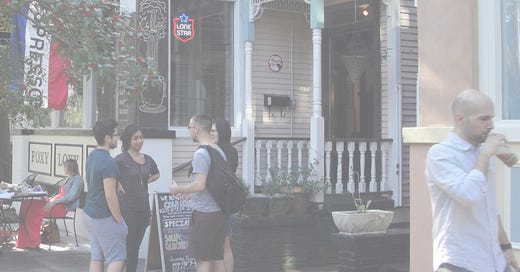




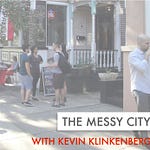
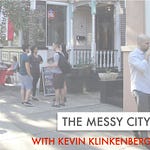
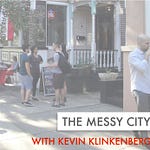
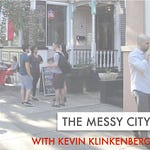
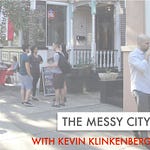
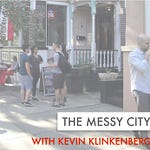
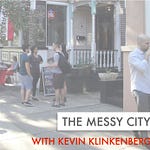
Share this post